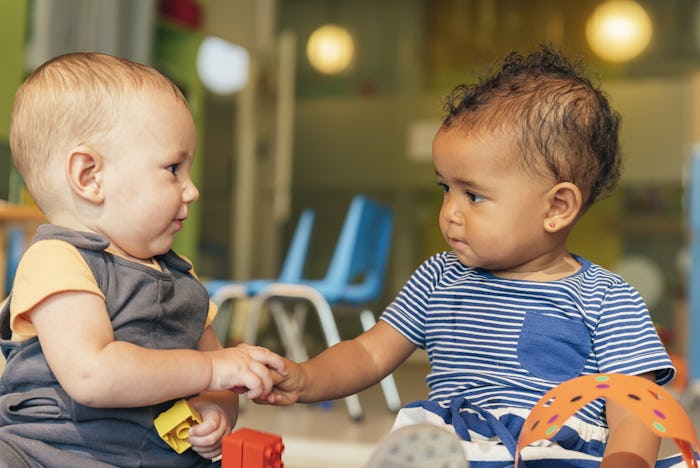It's hard enough to protect your kids from the flu when they're home with you, but once they go off to day care, the task of keeping them germ-free becomes considerably more challenging. If only you could follow your tot around with a bottle of hand sanitizer all day — but then, that sort of defeats the purpose of day care, and besides, the dang flu virus is airborne (so you'd be better off sending him in a mini surgeon's mask). Is there any way you can keep your kid safe from the flu at day care?
Unfortunately, much of what happens after you drop your little one off is out of your control. That's why the process of helping your child survive flu season safely actually begins when you're choosing a day care in the first place. Check out the policies your child's facility has in place involving mandatory vaccinations (in certain states, including California and Connecticut, a flu vaccine is mandatory for all children at licensed child care facilities), and make sure there are consistently enforced rules about when and for how long sick children have to stay home. Other things to think about: Are there enough hand-washing stations for the amount of kids, and are children instructed on how to use them properly? For that matter, are kids taught (and reminded often) to cough into their elbows and not all over the other children? And finally, are parents notified when a contagious illness hits the classroom?
Of course, by the time flu season comes along, chances are your kid has been in your day care of choice for a few months already at least, and switching facilities in favor of a less germ-promoting environment probably isn't an option. Still, there are some things you can do to help keep your tot as healthy as possible when he's out of your sight!
1Get Your Child The Flu Shot
As you've more than likely heard by now, this year's flu vaccine is being called particularly ineffectual: Jennifer Radtke, manager for infection prevention at the University of Tennessee Medical Center in Knoxville, told USA Today that this year's shot is estimated to be only between "10 to 33 percent effective." Even so, experts are calling it everybody's best shot (no pun intended) at not getting sick (except for babies younger than 6 months).
2Talk About Hygiene (Like, All the Time)
Assuming your little one is old enough to actually wash her own hands (and just in case there isn't somebody at her day care prompting her to suds up at regular intervals), talk to her about the importance of proper hand-washing as much as possible: Wash for 20 seconds, recommended the Centers for Disease Control & Prevention (CDC) (as long as it takes to sing "Row, Row, Row Your Boat") and dry thoroughly.
3Disinfect Anything Your Kid Brings Home
Remember how in The Velveteen Rabbit all the boy's toys had to be burned when he got scarlet fever? Traumatic though that may have been, apparently there was a good reason for purging the nursery of playthings: Research conducted at the University of Buffalo showed that bacteria survives on items in day cares such as toys and books for longer than previously thought. To be more specific, the flu virus survives on some surfaces for 24 hours, according to the CDC, (which basically means anything your kid brings home could be crawling with cooties). So when you unpack your child's backpack at the end of the day, make sure to thoroughly disinfect whatever you can.
4Discourage Oversharing
Yeah, technically you're supposed to be teaching your kid to share. During flu season, though, you might want to have a little chat (or two) about being a bit more selfish (in the most polite way possible, of course). Some day care centers already have rules forbidding kids to share food because of allergies, but if your child is old enough, talk to her about why she shouldn't give her BFF a bite of her cookie... even if it's a pretend cookie. Researchers from Georgia State University found that toys are likely an "important channel for the transmission of viral diseases among children," reported The Daily Mail. And if you've ever seen toddlers play "kitchen," you know that there's a lot of plastic food going in multiple children's mouths.
5Make a Plan
Despite your best efforts, it's unfortunately not terribly unlikely that your kid will get sick anyway (as of last year, the CDC estimated that since 2010, flu-related hospitalizations among children younger than 5 years ranged from 6,000 to 26,000). So it's best to make a "just in case" plan with your pediatrician ahead of time.
"Treatment is most effective when started early," Dr. Joshua Schaffzin, pediatric infectious diseases physician and director of infection, prevention and control at Cincinnati Children’s Hospital, told ABC News.
"So it's good to have a conversation beforehand, 'If the child becomes ill, what should our plan be?'"
Talking to your pediatrician ahead of time will also give you an idea of symptoms to watch out for and when you should head straight for the doctor's office. Depending on your child's age, treatment might include the antiviral drug Tamiflu (as well as plenty of rest and fluids, of course). And if she does get sick, be sure to keep her home until your doc gives the okay! Hopefully, your fellow day care parents will do the same.
Check out Romper's new video series, Romper's Doula Diaries:
Watch full episodes of Romper's Doula Diaries on Facebook Watch.
